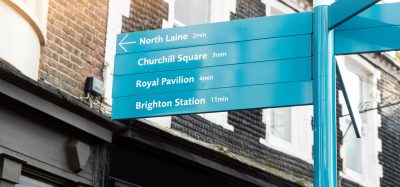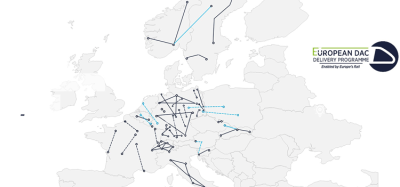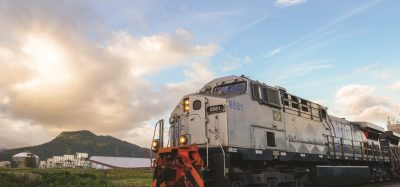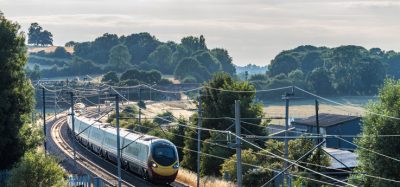Women Inspiring Rail: A Q&A with Katrin Höhne, TecEX Manager, DB
Posted: 19 December 2019 | Global Railway Review | No comments yet
For our next Women Inspiring Rail instalment, Katrin Höhne, Technical Excellence (TecEX) Manager at Deutsche Bahn, tells us about her work in the cross-divisional programme at DB and her vision for the future of rail.
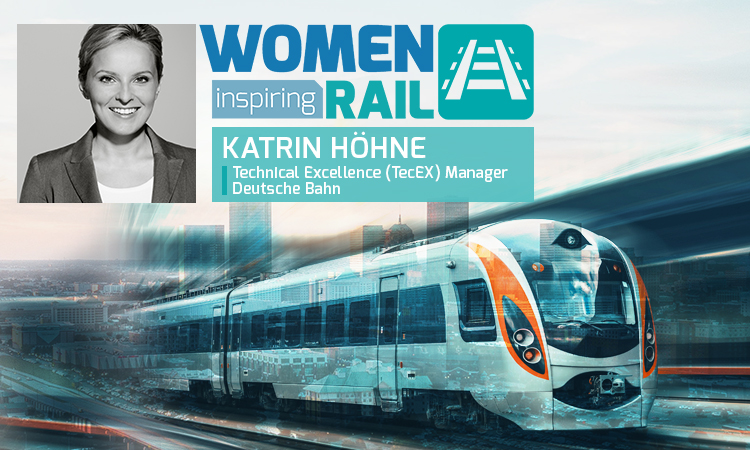

How did your career in rail begin and what does your current job involve?
I studied economics and communications at a technical university, and I have always been passionate about the mobility and transport sector. Especially about the technological challenges that have to be tackled, the innovative R&D that goes on, and the importance of taking an integrated view of technical expertise, market and industry trends, communication and innovation. I was directly involved in these areas at the Fraunhofer Institute, where I spent several years.
Fraunhofer had lots of business partnerships and international research partnerships in the mobility and transport sector in general and the rail sector in particular. In 2011, I joined Deutsche Bahn‘s transport and logistics division as a Communications and Change Manager. It was such engaging work: it gave me insights into the different rail freight organisations at DB. Later, I transferred to DB Cargo, our business unit for rail freight transport in Europe. There, too, I had the opportunity to do my favourite kind of work. My job focused on technological innovation projects – on their strategic design and practical implementation. It was an area where communication and transformation played an extremely important role.
Then, about two years ago, I transferred to DB’s digitalisation and technology division, where I am part of Technical Excellence – TecEX in short – a cross-divisional programme at DB that serves as an umbrella for 13 different technology initiatives. The initiatives cover a wide variety of areas, including condition-based maintenance, asset intelligence, IoT technology in rail operations, integrated driver assistance systems, and 3D printing. In everything we do, our goal is to take digitalisation and tech projects that are relevant to the whole company and make them faster and more effective. We also focus on building a real company-wide tech community.
What aspects of your job do you find the most challenging/rewarding, and why?
We have to be more proactive about working together and learning from each other”
At TecEX, I am mainly responsible for programme development, and specifically for portfolio integration and communications. The projects in our programme are very diverse, but they all have one thing in common: they are highly complex projects that are relevant to the rail system as a whole – that is, to our entire company and to the future of the rail sector. This means that we have to take an integrated approach to these projects and tackle them on a company-wide basis. They are the kind of project where it just makes sense to work together and find smart ways of pooling our expertise and resources. At the end of the day, it is our job to take solutions that have been developed, find the right scope for them at our company and establish end-to-end responsibility for them, making sure that they are actually implemented and monitored on the ground. Schedules and budgets are tight, and it can be tricky to keep an open mind for innovative ideas when you’re dealing with this kind of complexity. But what I know for certain is that we have to be more proactive about working together and learning from each other. It’s the only way to build a successful future for the rail sector.
We have to be efficient, consistent and build a real community. These factors will be essential to our success. We need effective stakeholder management, transparent communication and to be connected with each other. It’s a big challenge to make all this happen, especially in a company as big as ours. Another thing that is important in my work is really knowing each project and project team, understanding what is important at each phase in a project and recognising the type of communication which would be appropriate at that phase, the message that needs to be sent to people within and outside the company. It’s hard work, but I love the collaboration that goes on. We have definitely built a solid sense of community at TecEX. Of course, there is still room for improvement, especially where we intersect with other parts of the company. The way we approach things, the way we interact and work, is a new form of teamwork and team culture.
What is it about the rail industry that you are most passionate about?
We have great people at our company, too, who use their dedication and skill to make DB better, each and every day”
Looking back in time, rail was once the product and driver of the first industrial revolution. Now, some two centuries later, we are in the midst of the fourth industrial revolution, the digital revolution, and rail once again has a key role to play in mobility and transport. That in and of itself is something to be passionate about. For me, rail is truly the future of transport – especially when you see how much is being discussed about climate change and sustainability around the globe. I’m just a fan of rail, and I think we are in the midst of an incredibly interesting phase at the moment: we are in a phase of transformation, a phase where we have to find ways to combine digitalisation, IoT and traditional railway know-how. At DB, we are feeling this transformation acutely, and it certainly involves a number of challenges. Operational workflows are changing, new professions are emerging, and we are working more closely with other disciplines in other industries. And here, too, integration and communication are key.
To put all this in a nutshell: I think it’s fantastic to be able to make people and goods mobile. And we have great people at our company, too, who use their dedication and skill to make DB better, each and every day.
What has been your biggest achievement/proudest moment so far in your rail career?
It’s not easy to pick just one achievement or moment. I enjoy being involved in transformative processes in a technical environment. It’s great to bring experts together so that they can collaborate in order to achieve their goals better and faster. When I was in DB’s rail freight organisation, I worked with a team to organise an international networking event. We had around 200 technology experts from subsidiaries in 13 different countries who came together for two days to talk about industry trends, specific projects and the way we work together. It really felt special to see so many people from all across Europe come together for the first time to share their ideas and tackle specific issues in workshops. The feedback we received was incredibly positive. We started out as a small team of pioneers, if you will, with just a rough idea of how to do a meeting like this. But we ultimately developed an effective solution and an event that has since become a staple in our company. Together, we created something solid which has made our network of experts visible and has strengthened it in a lasting way. That makes me proud. Our event has made people in different countries aware of technical solutions and projects at our company, and some of these solutions and projects have since been adapted to our organisations in other countries and rolled out there.
Another thing I want to mention is that, in order for these kinds of projects to work, you also need managers who support them and make them possible. This was definitely the case for us, and I am very grateful for that.
How has the rail industry evolved since you joined? What have been the biggest changes?
More and more, our customers expect travel chains to be tailored to their individual needs, and they expect user-friendly, and increasingly eco-friendly, service”
I have been working in the rail industry for about eight years now, and the biggest development or change I have seen is definitely the growing influence of digitalisation in our sector. This change has brought with it other, additional changes that we are also facing. New mobility solutions have emerged and established themselves in the market. Our customers’ expectations have also changed and become more specific. The ‘digital generation’, in particular, expect to have mobility at their fingertips.
More and more, our customers expect travel chains to be tailored to their individual needs, and they expect user-friendly, and increasingly eco-friendly, service. Our task is to meet these customer needs and, ideally, stay a few steps ahead. We are working on this task, which we believe will be a constant as we look to the future. Another aspect I find interesting is that collaboration with non-rail-specific industries has also increased in recent years. We need rail experts, but we also need data scientists and artificial intelligence experts. They are all important now, and they will all continue to be important as we work to shape the future of the rail industry. Teams will become more heterogeneous – new ways of working will come into play.
Who within the rail community has been an inspiration to you, and why?
There are so many inspiring people in our industry. The diversity of knowledge and interests is what I find particularly inspiring. Recently, for example, I visited a signal box. We met there to plan a pilot project where handheld devices would be distributed to local employees to streamline and simplify some of their operational workflows. It was really inspiring for me to get to talk with people who work out there, on the line, every day. They know what challenges we face in operations, and they have so much first-hand experience. I also find it inspiring to talk with the people who develop our business strategy. What is important is bringing together different perspectives – and having the courage to try new things. I am especially inspired by people in our sector who are willing to be open about the challenges we face, who have innovative ideas, and who really make things happen.
Steffen Bobsien, the CEO of DB Cargo Polska, and Dr Miroslav Obrenovic, the head of the TecEX programme, are two of the many people who have been a great inspiration for me. They work both on developing strategies and on making real projects happen in practice. But there are so many other people too. Carlo Borghini, for example, the Executive Director of the Shift2Rail Joint Undertaking, does fantastic work together with his team. He is a major advocate for the sector at an international level, and a major driver of innovation.
What can be done to diversify the workforce in the rail sector? What advice would you give to those thinking about pursuing a career in rail?
Rail is truly the future of transport!
There is so much happening at the moment when it comes to diversity. Our sector is becoming more and more diverse in terms of technical background: as I’ve mentioned, these days, rail experts, data scientists and AI experts all work hand in hand on complex projects. This diversity enriches our work – and we’d never keep up without it. But of course, as with any change, there’s some rethinking that has to happen first. We have set up several innovation labs in recent years – new working environments which foster precisely these types of project setting. I think we still have a lot to learn here – and we are learning.
I have worked in tech for my entire career, and I have also noticed that teams are becoming more heterogeneous in terms of technical background. They are also becoming more international and inter-generational. And more and more women are discovering a passion for rail, engineering and IT. There is definitely still room for improvement, and I can only encourage anyone who may be interested to take a closer look at what our sector has to offer. There are lots of network associations and communities you can join to find contacts, learn more about the industry or just get a taste of what it’s like. The most important thing is to seize the opportunities out there and get started. The rail industry has so much to offer, especially now, in this current transformation phase. We are opening up to new mobility solutions, disciplines and forms of work. And one thing is clear: the rail industry has a bright future. I said it before, but it really encapsulates what I believe about our industry: rail is truly the future of transport!
If you would like to take part in the Women Inspiring Rail series, or would like to nominate a colleague to take part, please email: Leah Hockley, Junior Editor, Global Railway Review.
Related topics
3D Printing/Additive Manufacturing, Cargo, Freight & Heavy-Haul, Digitalisation, Internet of Things (IoT), Women in Rail




